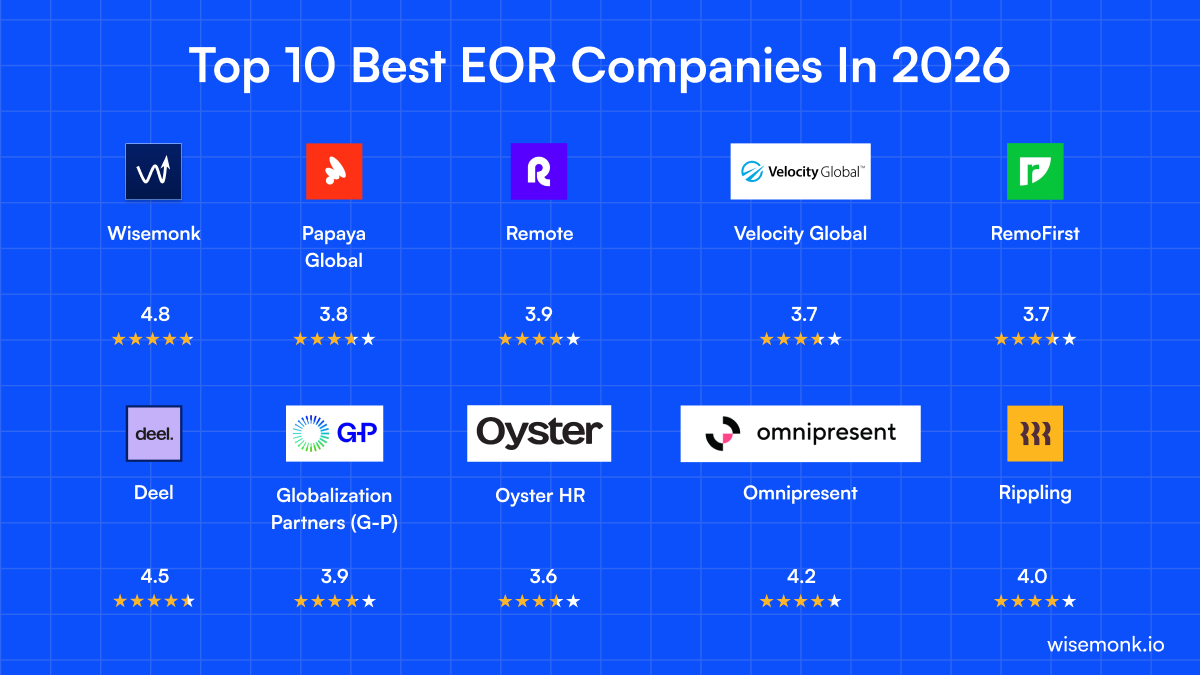- A PEO is a co-employment partner that manages payroll, benefits, compliance, and risk so businesses can focus on growth.
- The top PEO companies in 2025 include ADP TotalSource, TriNet, Justworks, Insperity, Paychex, CoAdvantage, BBSI, Infiniti HR, XcelHR, and Wisemonk
- PEO pricing depends on company size, industry risk, location, and the range of HR and payroll services included.
- Common alternatives to PEO services include EOR, ASO, HRO, Payroll Service Providers, HR Software Platforms, Fractional HR, Staffing and Recruitment Agencies, and setting up a Legal Entity.
- The best PEO providers offer transparent pricing, strong compliance support, reliable technology, and responsive customer service.
- Use an EOR instead of a PEO when you need to hire internationally without setting up a legal entity.
Need help with PEO services? Reach out to us today!
Discover how Wisemonk creates impactful and reliable content
Looking for the best PEO companies to handle payroll processing, employee benefits, and HR compliance? A professional employer organization provides comprehensive HR services through co-employment, letting you focus on business growth while experts manage regulatory compliance and benefits administration.
Top-rated PEO providers like ADP TotalSource, TriNet, Justworks, Insperity, Paychex, and Wisemonk offer proven solutions for US businesses seeking cost-effective workforce management. This guide compares leading professional employer organizations, pricing models, and key features to help founders and HR teams select the right PEO services. In this guide, we'll cover how PEO companies work, what they cost, and when alternatives like EOR or ASO make more sense for your business needs.
What are PEO companies?[toc=PEO Overview]
A PEO (Professional Employer Organization) provides outsourced HR services through a co-employment model where it becomes the Employer of Record for payroll, benefits, and compliance. The business keeps control over daily operations while the PEO manages payroll processing, benefits administration, risk management, and adherence to labor laws. PEO services help small and mid-sized companies cut administrative work, stay compliant, and offer competitive benefits. They act as an extension of your team, handling the entire employee lifecycle from onboarding to compliance, so you can focus on growth.
How do PEO companies work?[toc=PEO Process]
A PEO enters a co-employment relationship with your business, sharing responsibility for HR tasks like payroll, benefits, compliance, and risk management. While your company manages day-to-day operations, the PEO handles critical administrative functions to reduce your HR burden.
Key services offered by a PEO include:
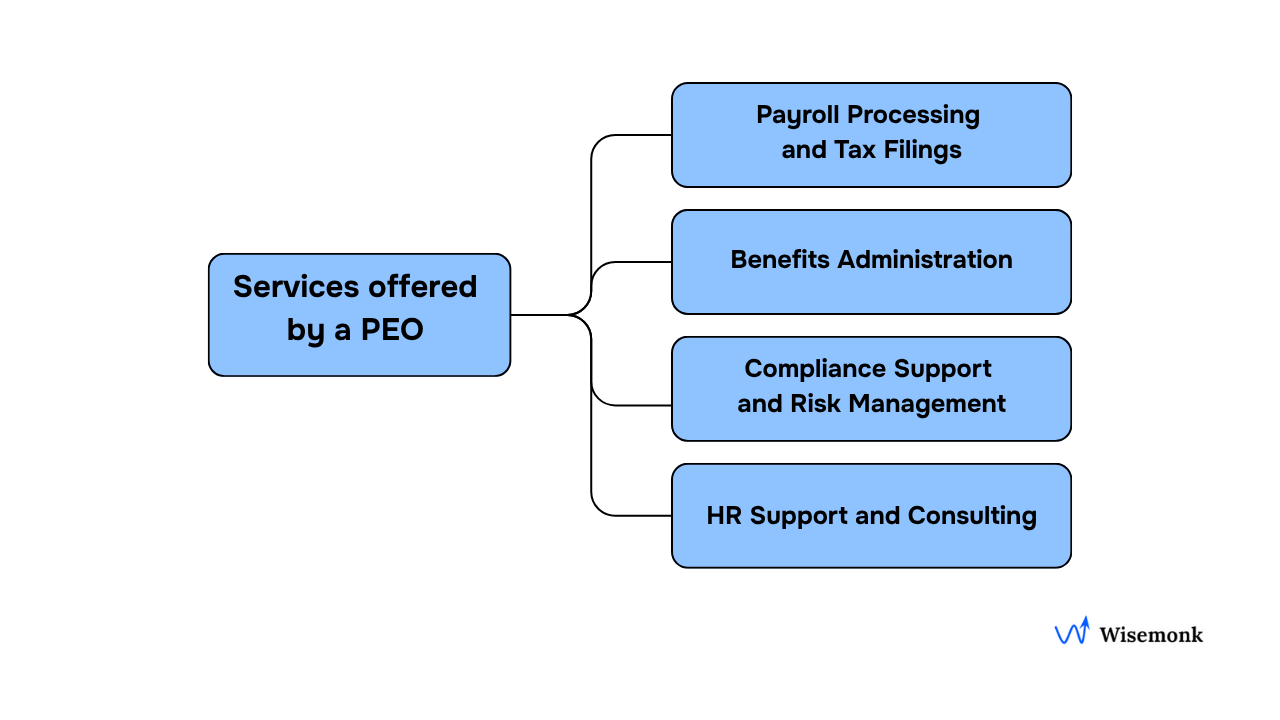
- Payroll Processing and Tax Filings: The PEO manages payroll, tax withholdings, and filings, ensuring compliance with federal, state, and local regulations.
- Benefits Administration: PEO services offer access to competitive benefits packages, such as health insurance and 401(k) plans, often at better rates due to pooling employees from multiple clients.
- Compliance Support and Risk Management: PEO helps businesses navigate complex employment laws, reducing the risk of penalties and lawsuits.
- HR Support and Consulting: They provide expert HR advice on employee relations, performance management, and regulatory compliance.
By outsourcing these functions, businesses can focus on growth while ensuring they stay compliant and competitive.
What are the best PEO companies in 2025?[toc=Best PEO Companies]
Here’s a list of the top 10 PEO companies to consider:
- ADP TotalSource
- TriNet
- Justworks
- Insperity
- Paychex
- CoAdvantage
- BBSI
- Infiniti HR
- XcelHR
- Wisemonk
1. ADP TotalSource
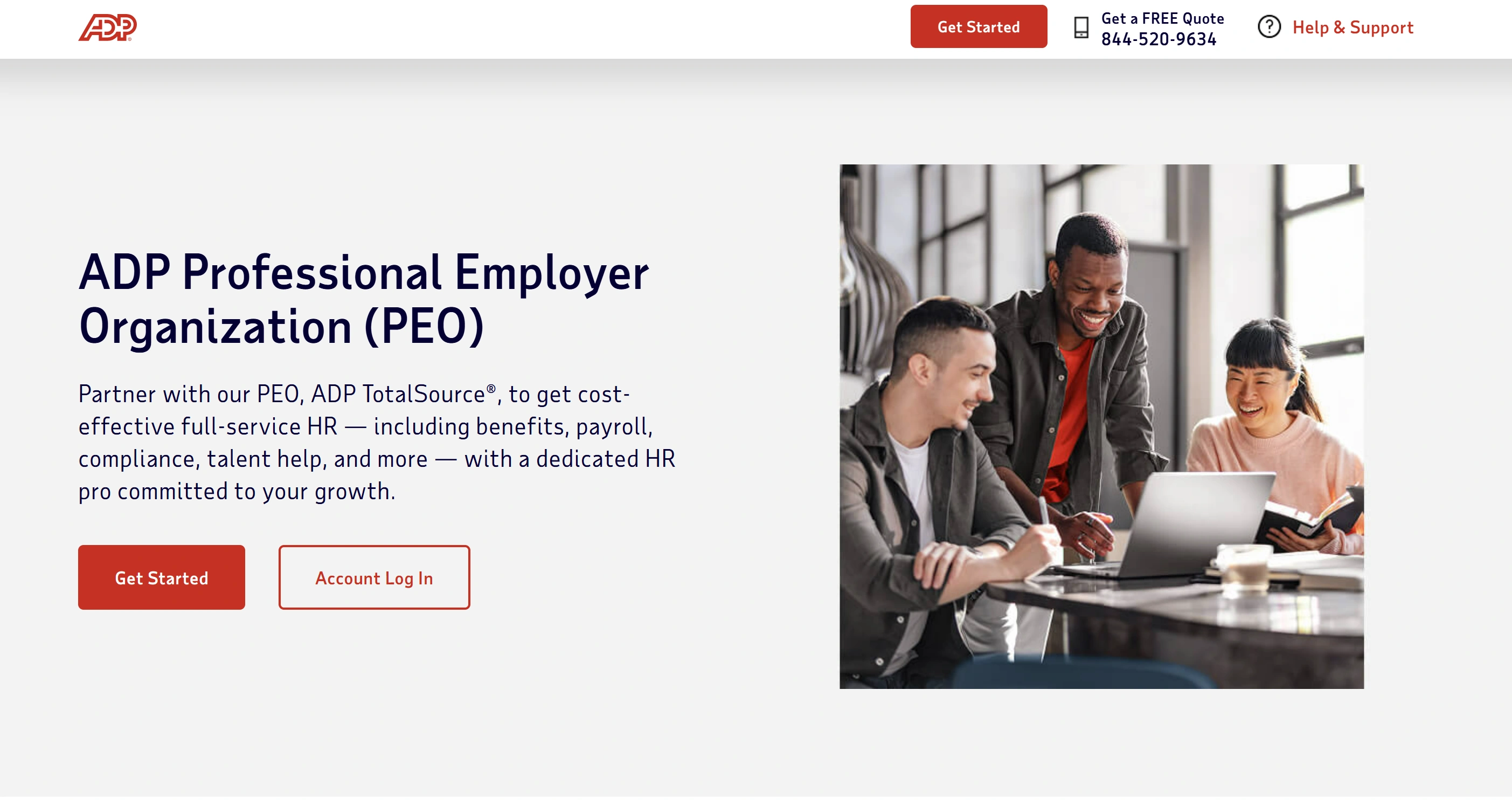
ADP TotalSource stands as the leading professional employer organization, providing comprehensive human resources solutions to businesses seeking to streamline HR operations and reduce administrative burdens. This certified professional employer organization leverages decades of HR and payroll expertise to deliver exceptional customer service and robust compliance support. With extensive experience in payroll tax compliance and benefits management, ADP TotalSource helps companies focus on core operations while ensuring regulatory compliance across multiple jurisdictions.
Best for: Growing businesses requiring enterprise-grade HR services and multi-state payroll processing capabilities.
Key Features:
- Automated payroll processing with comprehensive tax administration
- Extensive employee benefits packages including health insurance and retirement plans
- Advanced HRIS integration for seamless workforce management
- Multi-state compliance expertise and risk management services
- Dedicated HR professionals providing ongoing HR support
2. TriNet
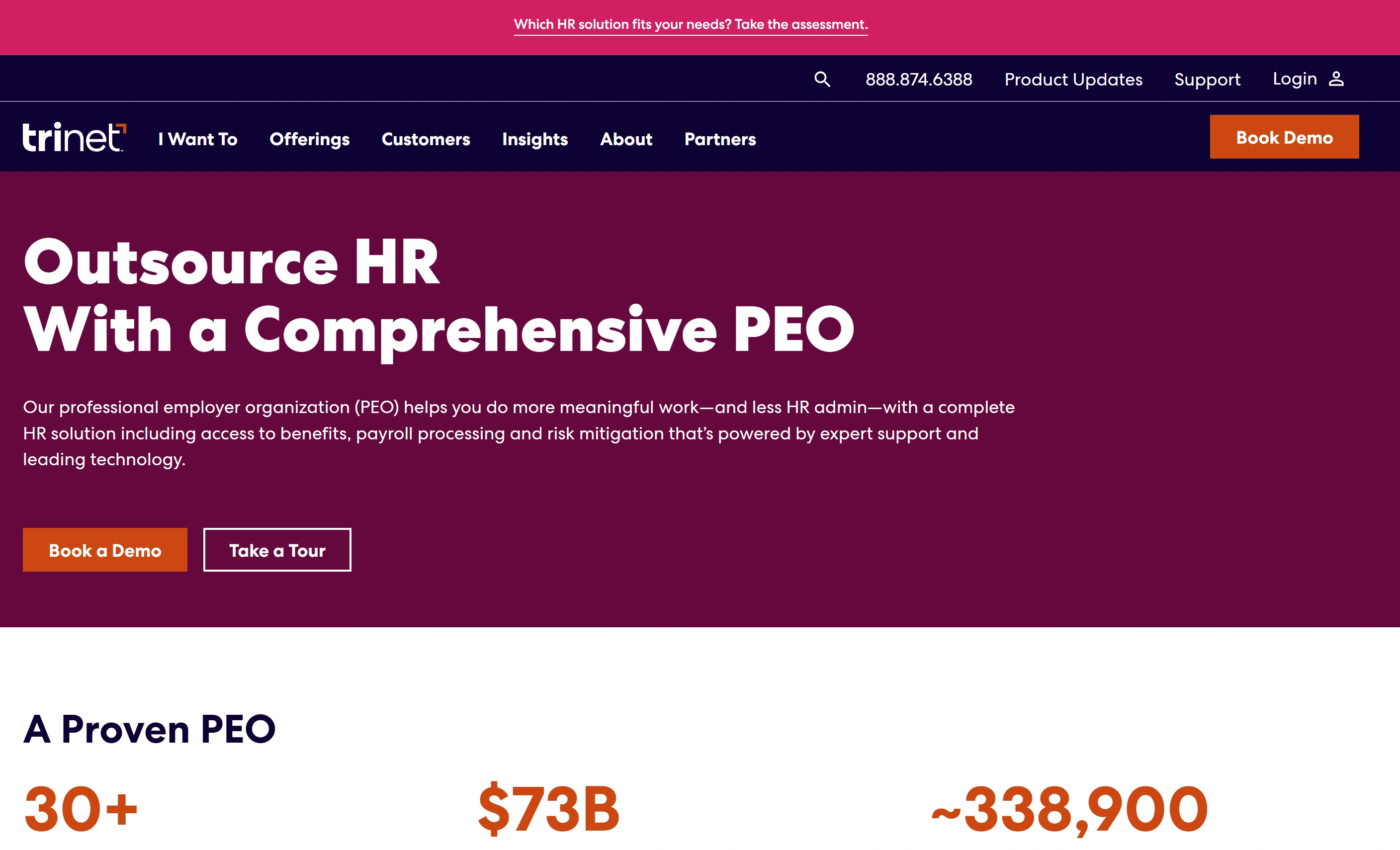
TriNet distinguishes itself as a leading professional employer organization specializing in industry-specific HR services and comprehensive human resources solutions. This PEO company provides tailored benefits administration and regulatory compliance support designed for mid sized businesses seeking expert guidance in their specific sectors. TriNet's co employment relationship model ensures clients receive dedicated HR consulting while maintaining control over core operations and business decisions.
Best for: Companies needing industry-specific expertise and specialized compliance support in regulated sectors.
Key Features:
- Industry-focused HR management with specialized compliance expertise
- Comprehensive employee benefits packages tailored to sector requirements
- Dedicated HR professionals with deep industry knowledge
- Advanced performance management and employee onboarding systems
- Robust workers compensation and employment practices liability insurance
3. Justworks
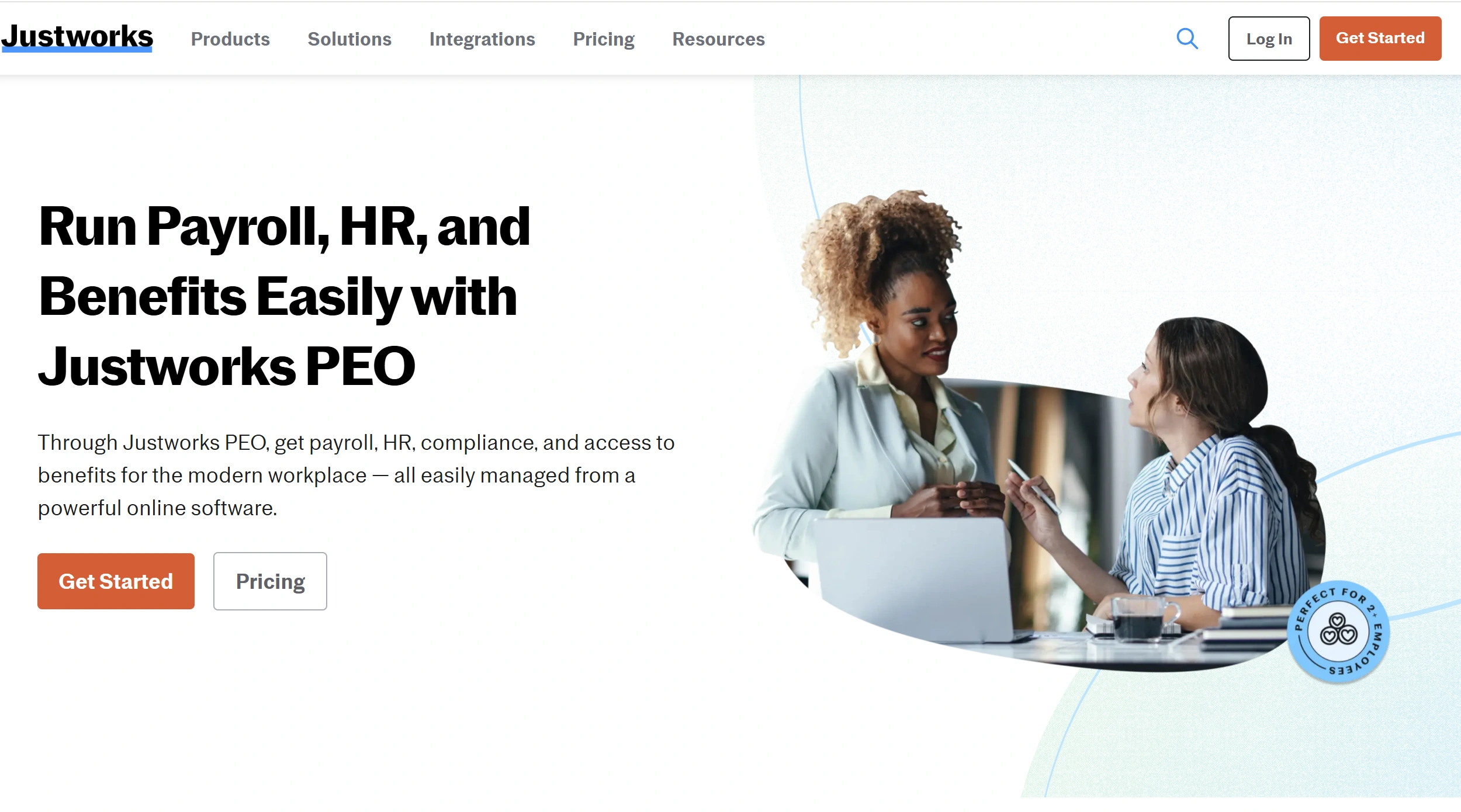
Justworks emerges as the preferred PEO company for small businesses seeking transparent pricing and comprehensive HR services without hidden fees. This professional employer organization combines intuitive HR administration with robust payroll processing and benefits management, making complex employment laws manageable for growing companies. Justworks excels in providing competitive employee benefits typically available only to larger organizations while maintaining simplicity in HR operations.
Best for: Small to mid-sized businesses prioritizing transparent pricing and user-friendly hr solutions.
Key Features:
- Transparent pricing model starting at competitive rates per employee
- Comprehensive benefits administration including health insurance and retirement plans
- User-friendly platform with employee self-service capabilities
- Month-to-month contracts providing maximum flexibility
- 24/7 HR support and dedicated customer service teams
4. Insperity

Insperity provides comprehensive HR services designed specifically for small businesses and mid sized businesses requiring hands-on HR support and extensive training resources. This established PEO company combines traditional benefits administration with innovative performance management solutions, helping client companies develop their workforce while ensuring compliance with local employment laws. Insperity's co employment arrangement includes access to over 6,500 educational resources and dedicated HR professionals.
Best for: Small businesses seeking comprehensive training programs and dedicated HR consulting support.
Key Features:
- Extensive employee training programs with 300+ online courses
- Dedicated HR professionals providing strategic workforce management
- Comprehensive benefits administration with competitive health insurance options
- Flexible service options allowing customized HR and payroll needs
- Mobile-accessible platform for employee onboarding and HR tasks
5.Paychex

Paychex operates as a well-established PEO company delivering scalable HR services and comprehensive payroll administration to businesses of all sizes. Known for exceptional customer service and reliable HR operations, this professional employer organization helps companies navigate complex employment laws while providing competitive employee benefits packages. Paychex's comprehensive human resources solutions include advanced workforce management tools and robust compliance support.
Best for: Established businesses seeking reliable, scalable HR services with strong customer support.
Key Features:
- Scalable HR and payroll services adapting to business growth
- Comprehensive benefits management with extensive insurance services
- Advanced time and attendance tracking integrated with payroll processing
- Risk management services including workers compensation administration
- Dedicated account managers providing ongoing HR support
6. CoAdvantage

CoAdvantage delivers personalized PEO services through regional teams providing local expertise in HR management and comprehensive benefits administration. This professional employer organization focuses on building strong client relationships while offering competitive employee benefits packages and robust compliance support. CoAdvantage's approach combines cost-effective HR solutions with dedicated HR professionals who understand local regulations and business environments.
Best for: Businesses seeking personalized, regional support with competitive pricing and dedicated HR consulting.
Key Features:
- Regional support teams providing personalized HR consulting services
- Comprehensive benefits administration with group buying power advantages
- Competitive pricing structure with transparent fee arrangements
- Robust workers compensation and risk management services
- Dedicated HR professionals supporting compliance management across 50 states
7. BBSI
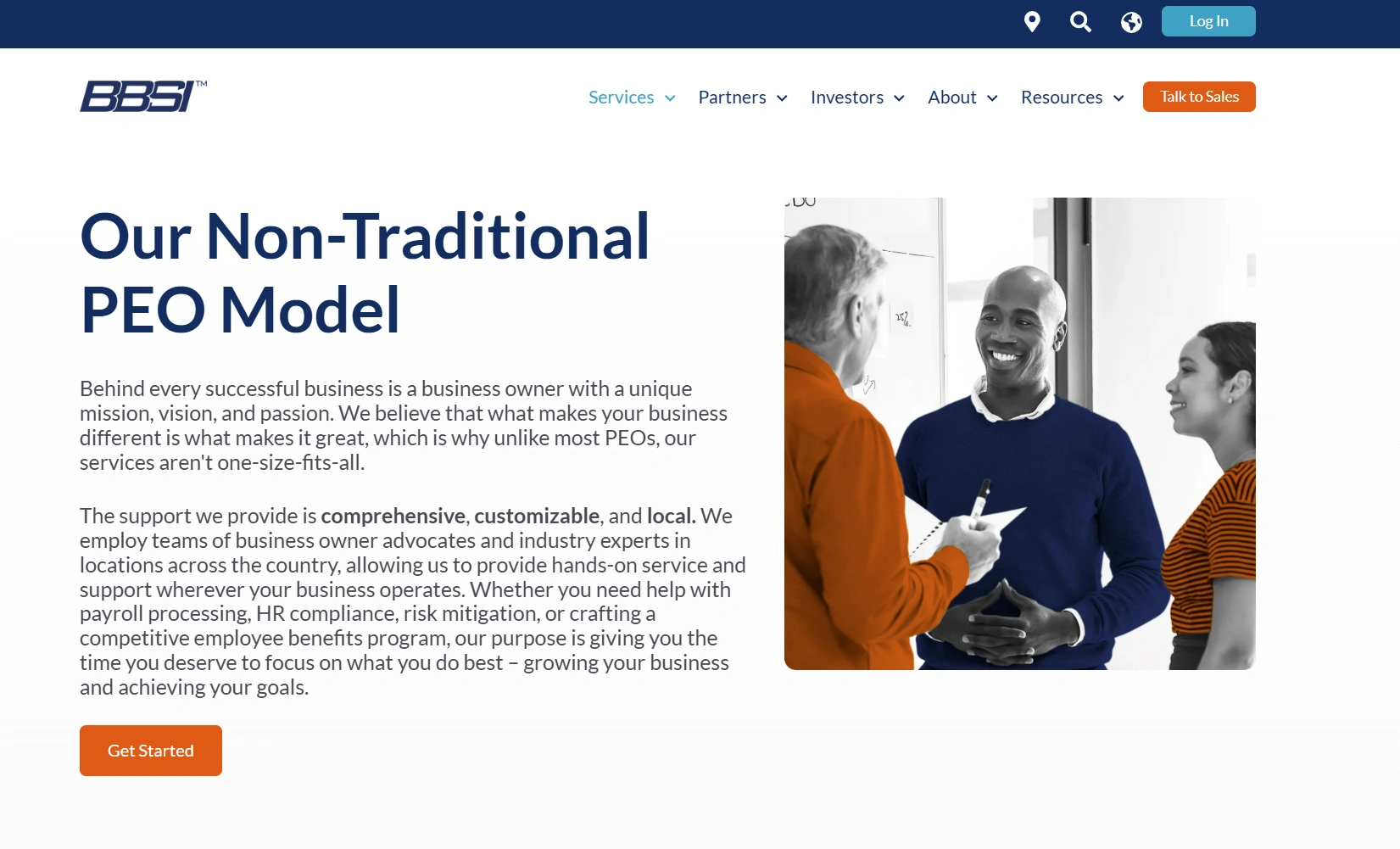
BBSI differentiates itself as a PEO company providing comprehensive HR services enhanced by local business consulting and community engagement initiatives. This professional employer organization goes beyond traditional benefits administration to offer strategic HR consulting and risk management services while fostering local business communities. BBSI's co employment relationship includes value-added services supporting overall business performance and operational efficiency.
Best for: Companies valuing local relationships, community engagement, and comprehensive business consulting beyond basic HR services.
Key Features:
- Local support teams providing personalized HR consulting and business guidance
- Community building events fostering networking and knowledge sharing
- Comprehensive HR services including payroll processing and benefits administration
- Strategic business consulting extending beyond traditional PEO services
- Risk management services with focus on workplace safety and compliance
8. Infiniti HR

Infiniti HR specializes in providing comprehensive human resources solutions for larger enterprises and franchise operations requiring scalable HR management and sophisticated benefits administration. This PEO company excels in managing complex workforce requirements while ensuring regulatory compliance across multiple locations. Infiniti HR's professional employer organization model includes customizable HR services and specialized support for hospitality and franchise sectors.
Best for: Large enterprises, franchises, and multi-location businesses requiring scalable, enterprise-grade HR solutions.
Key Features:
- Scalable HR services designed for large workforce management
- Specialized franchise and multi-location support with centralized administration
- Comprehensive benefits administration with enterprise-level packages
- Advanced compliance management across all 50 states
- Customizable a la carte service options meeting specific business requirements
9. XcelHR

XcelHR positions itself as the leading professional employer organization specializing in risk management services and comprehensive compliance support for businesses in high-risk industries. This certified professional employer organization combines traditional HR administration with advanced safety programs and workers compensation management. XcelHR's expertise in complex employment laws and regulatory compliance makes it ideal for companies requiring specialized risk mitigation strategies.
Best for: Companies in high-risk industries requiring specialized compliance support and comprehensive workers compensation management.
Key Features:
- Specialized risk management and workplace safety programs
- Comprehensive workers compensation administration with claims management
- Advanced compliance support for high-risk industry regulations
- Flexible pricing options including percentage of payroll models
- Certified professional employer organization status ensuring financial stability
10. Wisemonk

Wisemonk serves as the leading professional employer organization specializing in India operations, providing comprehensive human resources solutions for global companies seeking cost-effective talent acquisition and management. This PEO company combines deep knowledge of local employment laws with competitive benefits administration, enabling businesses to access India's skilled workforce while ensuring full regulatory compliance. Wisemonk's approach reduces administrative burdens while providing access to top-tier talent at significant cost savings.
Best for: Global companies seeking cost-effective India operations with expert local compliance and talent management.
Key Features:
- Comprehensive India compliance management with expert knowledge of local regulations
- Cost-effective HR and payroll services delivering up to 83% savings versus traditional providers
- Full-service talent acquisition and employee onboarding in under one week
- Complete benefits administration including health insurance and statutory compliance
- Time zone advantages and dedicated HR support for seamless international operations
What do Wisemonk customers say?
"I'm very happy that I discovered Wisemonk. They have been a pure pleasure to work with, and their attention to detail is impressive. They helped us understand their pricing model, find top-qualified individuals, interview them, and then onboard them. I gave them criteria for the type of people we sought, and they delivered. The individuals they were able to find have been some of the best engineers I have ever worked with. I recommend Wisemonk to anyone who is in need of staffing assistance."
- Dan Sampson, Head of Engineering at Cobu
"Working with the Wisemonk team in India has been a genuinely positive experience from day one. They've been consistently accessible and are building fantastic relationships with our local team. As someone based in the UK, I value the quality of compliance Wisemonk brings — I have full confidence when it comes to financial, legal, and HR matters. They've ensured our team is managed in line with local employment law and have also been flexible when we've wanted to go beyond statutory requirements. Whether it's increasing annual leave or tailoring health insurance, they've offered clear guidance to help us enhance the benefits we provide. It's been a great partnership."
- Lisa Jones, Chief People Officer at Couch Health
How much do PEO services cost in 2025?[toc=PEO Pricing]
PEO costs range from $100-$200 per employee monthly or 2-8% of total payroll. Small businesses typically pay more per employee than larger companies due to economies of scale.
Two Main Pricing Models:
- Percentage of Payroll: Most PEO companies charge a fixed percentage of total payroll. Smaller companies usually pay 8–12%, while larger ones pay 2–4% as their workforce grows.
- Flat Fee (PEPM/PEPY): A predictable monthly rate per employee, usually $40–$200 per month (or $500–$2,400 yearly). This model suits businesses with higher-salaried staff who want transparent costs.
Key Cost Factors:
- Scope of Services: Payroll-only plans cost less than full HR outsourcing with benefits and training.
- Company Size: Bigger teams qualify for discounts.
- Industry Risk: High-risk sectors pay more due to workers’ compensation.
- Location: Labor laws and payroll taxes vary by state, influencing pricing.
Watch Out for Hidden Costs:
- Setup fees: $200-$1,000 for onboarding
- Technology access: Monthly HRIS platform fees
- Benefits markups: 5-15% added to insurance premiums
- State unemployment fees: $50-$500 per employee annually
- Premium services: $25-$150/hour for consulting
- Exit fees: Early termination penalties
Real ROI:
According to NAPEO, businesses see an average 27% return on investment from PEO services. Most companies save $1,775 per employee annually through reduced administrative costs and better benefit rates.
To learn more about the cost of a Professional employer organization (PEO), refer to out guide on How much does a PEO Cost? A Complete Guide for 2025
What are the alternatives to PEO companies for HR Outsourcing?[toc=PEO Alternatives]
When looking for alternatives to a Professional Employer Organization (PEO), businesses have multiple options depending on their size, operational needs, and growth plans.
Below are the most effective PEO alternatives:
- Employer of Record (EOR)
- Administrative Services Only (ASO)
- Human Resources Outsourcing (HRO)
- Payroll Service Providers
- HR Software Platforms (HRIS)
- Fractional HR Services
- Staffing and Recruitment Agencies
- Setting up a Legal Entity
1. Employer of Record (EOR)
Key difference: EOR becomes the legal employer for your workforce in foreign countries, handling all local compliance, tax, and legal liabilities.
Best for: Companies expanding globally who need to hire in multiple countries quickly without setting up local entities.
Flexibility: Ideal for international teams as the EOR manages local employment regulations, payroll, and employee benefits.
Read more: PEO vs. EOR: Which is Right for Your Business 2025?
To learn more about the best Employer of Record companies, refer to this detailed guide on 10 Best Employer of Record (EOR) Companies
2. Administrative Services Organizations (ASOs)
Key difference: ASO provides administrative HR functions like payroll, benefits administration, and compliance support without entering a co-employment relationship.
Best for: Businesses that want HR operational assistance while retaining full employer control and liability.
Flexibility: Suitable for companies seeking support on HR tasks without sharing employer status or responsibilities.
Read more: PEO vs. ASO: Which HR Model is Right for U.S. SMBs?
3. Human Resources Outsourcing (HRO)
Key difference: HRO offers outsourcing of specific or comprehensive HR functions such as recruiting, compliance management, and policy development, without co-employment.
Best for: Organizations with an internal HR team that require scalable, flexible support for specialized HR services.
Flexibility: Allows customized engagement for various HR needs, from limited to full-service HR outsourcing.
Read more: PEO vs. HRO: Which Is Right for Your Business?
4. Payroll Service Providers
Key difference: Specialized providers focus primarily on payroll processing, tax filings, and compliance with payroll-related regulations.
Best for: Companies looking to outsource payroll operations without full HR or employment outsourcing.
Flexibility: Usually offers add-on services like tax compliance but limited HR administration or legal support.
5. HR Software (HRIS/Payroll Providers)
Key difference: Technology platforms that automate payroll, employee data management, benefits administration, and compliance tracking.
Best for: Businesses wanting self-managed HR with automated processes powered by software solutions.
Flexibility: Provides in-house control with scalable features; relies on internal HR management.
6. Fractional HR
Key difference: Contracting part-time or project-based HR experts to provide leadership, strategy, and operational support.
Best for: Startups and small to medium-sized businesses not ready for a full HR department but needing expert input.
Flexibility: Offers on-demand HR expertise without long-term commitments.
7. Staffing and Recruitment Agencies
Key difference: Agencies handle sourcing, recruitment, and sometimes payroll for temporary or contract workers without permanent employer responsibility.
Best for: Companies needing flexible, project-based workforce solutions or short-term hiring.
Flexibility: Perfect for seasonal or contract workforce needs without ongoing employment liabilities.
8. Setting up a Legal Entity
Key difference: The business creates its own local legal entity to directly employ workers, assuming full responsibility for compliance and HR.
Best for: Companies with long-term expansion plans that require full operational control and market presence.
Flexibility: Requires significant investment and compliance management but maximizes control.
Read more: Employer of Record vs. Own Entity
Each alternative provides a different balance of control, service flexibility, and scalability. Choose based on your company’s specific needs, whether it’s retaining full control with support or delegating HR tasks to a trusted external partner.
Why do companies choose PEO services? Key Benefits Explained[toc=PEO Benefits]
Companies use a PEO to simplify HR, payroll, and compliance management while gaining access to better employee benefits and risk protection. For small and mid-sized businesses, it’s a strategic way to scale efficiently without building a full internal HR team.
- Time and Cost Savings: PEO services cut administrative workload and reduce HR overhead, leading to an average 27% annual ROI, according to NAPEO.
- Access to Better Benefits: They give small businesses access to Fortune 500–level benefits at affordable group rates.
- Reduced Liability: PEO shares employer responsibilities and ensure compliance with tax and labor laws, reducing legal and financial risk.
- Business Growth and Stability: PEO-supported businesses grow 2x faster, have 12% lower turnover, and are 50% less likely to fail than those managing HR alone.
How to choose the right PEO company for your business?[toc=Choosing PEO]
Choosing the right PEO company can make or break your HR experience. Here are the key questions every business should ask before signing a contract:
- What HR support do we actually need and what’s our budget?
Start by defining which HR tasks you want to outsource, payroll, benefits, or compliance, and set a clear budget. PEO companeis usually charge either a flat fee per employee or a percentage of payroll, so choose the model that fits your cash flow. - Is the PEO financially stable and certified?
Always check for IRS Certified PEO (CPEO) status or ESAC accreditation, which prove the provider meets industry and financial standards. Ask for independent financial audits and client references in your industry. - What services and technology are included?
Get a list of what’s covered in the standard package and what costs extra. Request a demo of their HR platform, it should be intuitive, secure, and offer employee self-service tools for onboarding, payroll, and benefits. - How strong is their customer support?
Find out if you’ll get a dedicated HR manager or be routed through a general helpline. Ask about response times, communication channels, and client-to-staff ratios to gauge how personalized their support really is. - Are the pricing and contract terms transparent?
Insist on a detailed breakdown of all fees, including setup, add-ons, and potential termination costs. Clarify how fees change with raises or new hires and review renewal or exit terms before committing.
By asking these questions, you’ll quickly identify which PEO providers are transparent, reliable, and equipped to grow with your business.
When is an EOR better than a PEO?[toc=EOR vs PEO]
Use an Employer of Record (EOR) when you need to hire in a country where you don’t have a legal entity; the EOR becomes the legal employer, handles payroll, benefits, and compliance locally, and assumes employment liability. A PEO is for companies that already have an entity (e.g., in the US) and want co-employment support for HR and payroll.
- No entity needed, faster starts: EORs let you onboard employees in new countries without forming a subsidiary, often in days, because the provider already has local infrastructure.
- Liability & compliance shift: With a PEO you share responsibility under co-employment; with an EOR the provider is the legal employer and carries the local compliance risk.
- Multi-country coverage: One EOR can standardize payroll, benefits, and contracts across multiple countries, useful for distributed teams testing new markets.
- When PEO falls short: PEO companies generally require your local entity; if you lack one (or don’t want to set it up yet), EOR is the correct model.
choose PEO for domestic HR and payroll when you already operate locally; choose EOR to hire abroad quickly and compliantly without the cost and delay of entity formation.
How Wisemonk supports global hiring and compliance?[toc=Wisemonk global hiring]
Wisemonk is a leading Employer of Record (EOR) helping global companies hire, pay, and manage employees, without the hassle of setting up a local entity. With our deep understanding of local employment laws, tax compliance, and cross-border workforce management, we enable businesses to expand quickly while staying compliant and efficient.
Here’s how we help global businesses.
- We act as the legal employer for your global team in India, handling employment contracts, payroll, benefits, and compliance under local regulations.
- Hire and onboard top Indian talent in under a week, fully compliant with India’s labor and tax laws.
- We handle PF, ESI, gratuity, professional tax, and income tax filings to keep your team compliant year-round.
- Provide competitive and compliant benefits like health insurance, paid leave, and retirement plans tailored to Indian labor norms.
- Ensure new hires are productive from day one with laptops and IT setups delivered directly to their doorstep.
- Our HR experts manage day-to-day HR tasks, ensuring employee satisfaction and smooth operations.
While India is our core strength, we understand that many businesses have global ambitions. That’s why we also support clients expanding into key markets like the United Kingdom, the United States and beyond. With Wisemonk, you get a reliable partner for your India operations and your broader global hiring journey.
Ready to simplify hiring? Book a free consultation call with Wisemonk to find the best approach for scaling your team efficiently, affordably, and with full compliance.
Frequently asked questions
What is the best PEO provider?
Top PEO providers in 2025 include ADP TotalSource for mid-sized companies, TriNet for industry-specific solutions, and Justworks for small businesses with transparent pricing. Companies using PEOs experience an average 27.2% ROI and grow 7-9% faster than competitors. Wisemonk stands out among leading PEO providers by offering comprehensive co-employment solutions with specialized expertise in technology, professional services, and growing businesses seeking scalable HR infrastructure.
What is the downside of a PEO?
Main PEO disadvantages include loss of control over HR decisions, limited flexibility in vendor selection, and potential cultural disconnect with standardized policies. Pricing typically ranges from $900-$1,500 per employee annually or 2-12% of total payroll. Companies may also face challenges with shared liability, communication delays, and dependency on third-party providers.
What industries are top fits for PEO?
PEO services excel in healthcare, technology startups, professional services, financial services, nonprofits, and franchise sector. Industry-specific PEOs provide specialized compliance knowledge for construction, hospitality, and manufacturing companies. Small to mid-sized businesses with 10-500 employees benefit most from PEO co-employment models. Wisemonk specializes in serving high-growth technology companies, professional services firms, and scaling startups with tailored PEO solutions that understand industry-specific compliance and benefit needs.
Is PEO a good investment?
Yes - NAPEO research shows PEO clients achieve 27.2% average ROI with $1,775 annual savings per employee while investing $1,395. Businesses using PEOs grow 7-9% faster, have 10-14% lower turnover, and are 50% less likely to fail than non-PEO companies. Cost savings come from reduced HR staff expenses (54%), lower health benefits costs (37%), and workers' compensation savings. Wisemonk delivers proven ROI through streamlined operations, competitive benefit packages, and compliance expertise that allows clients to focus on core business growth.
What is the largest PEO in the US?
ADP TotalSource is the largest PEO in the United States, operating in all 50 states with 45 regional offices and serving clients in over 140 countries. Other major providers include TriNet serving over 390,000 worksite employees and Paychex leveraging 40+ years of payroll expertise. The PEO industry was valued at $66.23 billion in 2024 and projects 11.10% annual growth through 2033. While Wisemonk operates as a PEO focused on personalized service, we compete effectively against industry giants by offering superior client relationships and customized solutions for growing companies.
What are the three types of PEO?
The three main PEO types are Full-Service PEOs offering comprehensive co-employment, Administrative Services Organizations (ASOs) providing services without co-employment, and Specialized PEOs focused on specific industries or functions. Alternative classifications include Traditional, Transactional, and Strategic PEO models based on service delivery approach. Full-service models suit high-growth companies, while carve-out models work for businesses with existing vendor relationships. Wisemonk operates as a strategic, full-service PEO that combines comprehensive HR solutions with industry expertise and personalized support for scaling businesses.
What is the difference between a PEO and a HR outsourcing (HRO) company?
A PEO shares employer responsibilities and manages payroll taxes, benefits administration, and labor law compliance. An HRO provides outsourced HR services without co-employment, you remain the sole employer, and they simply manage selected HR functions like recruiting or training.
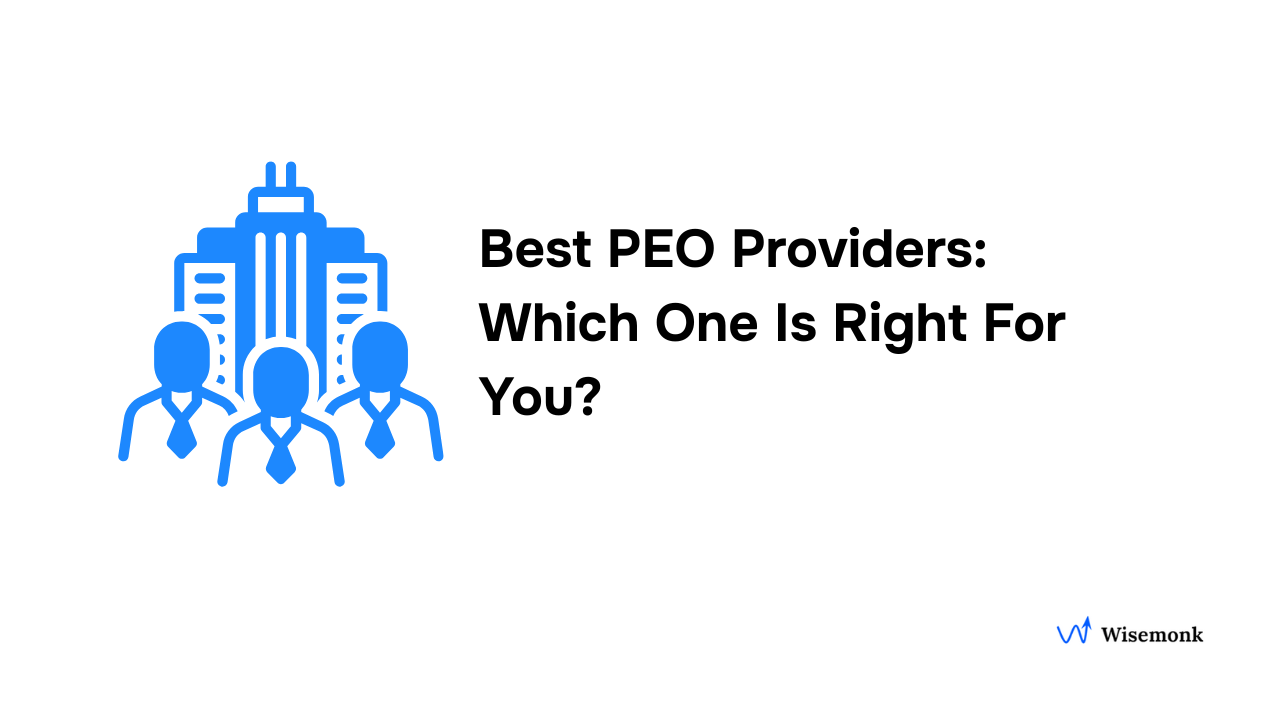
.png)
%20(1).webp)
